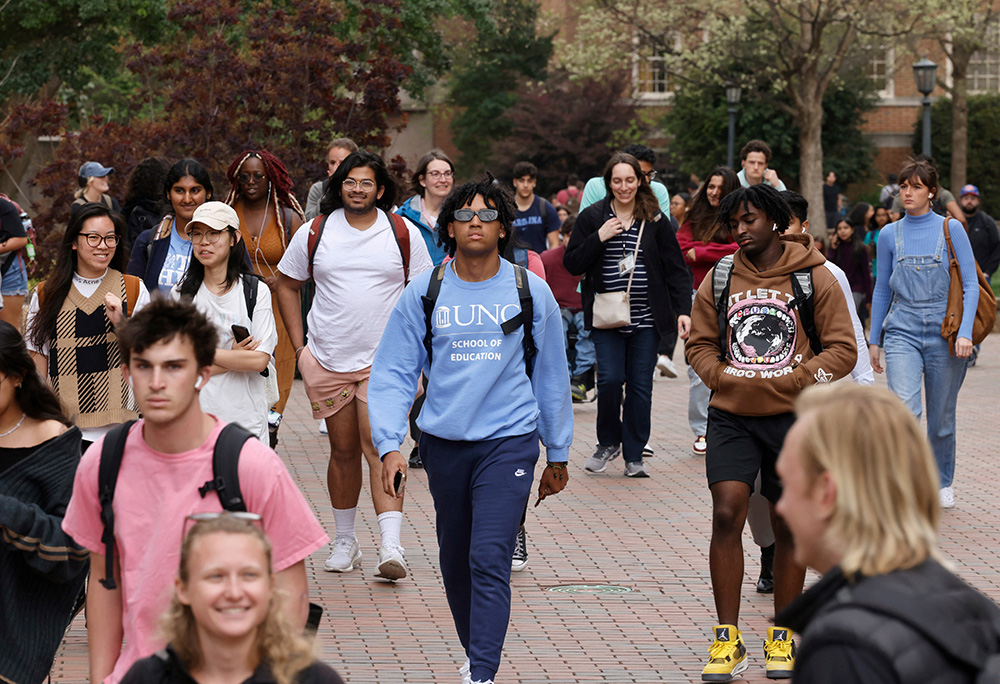
WASHINGTON — As parents around the country recently moved their children into dorm rooms for their first year of college, many might wonder how their sons or daughters will do academically or fit in socially, but another question some are asking is if their children will stick with the faith tradition they were raised in.
For Catholic parents, this is a real concern, because studies have shown that a significant number of young people leave the faith during their college years. According to the Pew Research Center, 79% of former Catholics left the Church before the age of 23, and the Public Religion Research Institute reports that 90% of “nones” — those who just have no religion — left before the age of 29.
These statistics have not gone unnoticed.
This summer, Bishop Robert Barron of the Diocese of Winona-Rochester, Minnesota, and founder of the nonprofit Word on Fire Catholic Ministries media apostolate, launched an outreach to provide Bibles to college freshmen, citing these very surveys.
As of late August, the outreach, which asked for donations from around the country, sent more than 12,500 paperback versions of “The Gospel” — a Word on Fire produced version of the Bible containing the Gospel narratives, artwork, and commentary — to students at 89 U.S. colleges and universities.
In a statement, the bishop said the initiative provides a “powerful evangelical tool that can transform people’s lives — both those who are already engaged in their faith and those who are in danger of leaving the flock.”
Catholic campus ministry programs are also at work hoping to bring Catholic students to Mass and other programs, knowing full well that today’s students have a lot of other options and are no longer under their parents’ supervision for Mass attendance.
When asked how these programs can keep Catholic students from leaving the faith, Paulist Father Larry Rice, chaplain at Rensselaer Polytechnic Institute in Troy, New York, said he wished there was a secret. “I don’t think there is — there is just a lot of hard work. As with many things,” he added, “this is not a problem with one solution, there is not one handle you can grab.”
He told The Tablet that campus ministry programs are dealing with an overall decrease in “religiosity in general” with young people leading the way and which was exacerbated by the pandemic.
The priest pointed out that trying to reach young adults is “not much different from how we reach everyone else,” noting that successful parishes are welcoming and have good music and preaching. That’s what he hopes people will experience inside the church doors, but “how to get them into the doors is another issue.”
For his part, he said he follows Pope Francis’ message of going out to people and accompanying them, which for him means getting out of his office and walking around campus or showing up at events and having conversations with students.
What he has found is that a lot of people, young adults in particular, are looking to form connections and friendships, which is why the campus ministry program provides a lot of meals and coffee receptions after Sunday Masses.
Getting to know students is also a big emphasis of the Fellowship of Catholic University Students, a Catholic college and university outreach program known as FOCUS. The program, now in its 25th year, continues to grow, now serving at more than 200 colleges and universities in the United States, including this year at Queens College, part of the City University of New York, in Flushing.
FOCUS missionaries aim to form friendships with campus students over coffee or ultimate Frisbee games and then invite students to Mass or Bible studies.
John Michael Lucido, a FOCUS South regional director and 2018 graduate of Texas A&M University in College Station, Texas, said college students have changed even since he graduated because most of today’s students essentially grew up with smartphones. As he sees it, they have communicated more through digital means and now feel more alone “from each other, God, friendships, and relationships.”
But even over the years, college has been a time when young people tend to rethink the faith they grew up with. Lucido attributes this in part to the time in people’s lives when they are asking more questions and getting a lot of potential answers.
He said those involved with FOCUS want to “get in that space with other answers” telling young people that they were “made for a relationship with Christ” and the meaning of life is to “love God and be part of his Church.”
Father Rice takes a long view of campus ministry, recognizing that there will be drops in participation, but he looks for Mass attendance to increase over time.
“For me, it’s rewarding work,” he said, adding that he is not alone in working with others.
Lucido said parents are right to be concerned about their students’ faith journey, but they can do some groundwork first to find out what different colleges provide as far as campus ministry.
He said parents aren’t likely going to help by being overbearing and frequently asking their college-age children if they went to Mass.
“There has to be a certain level of trust that you did everything right to raise your children in the faith,” then trust God and put trust in your child, he said, adding that the ongoing task is to “pray for them.”
